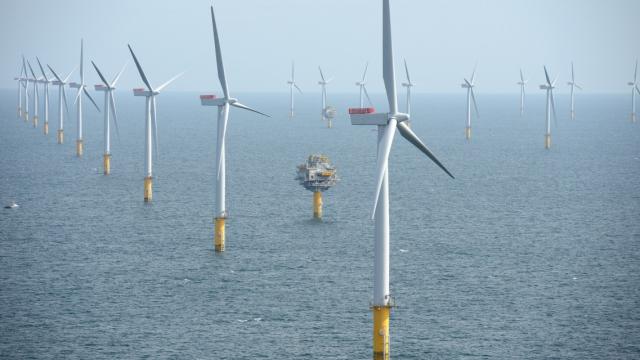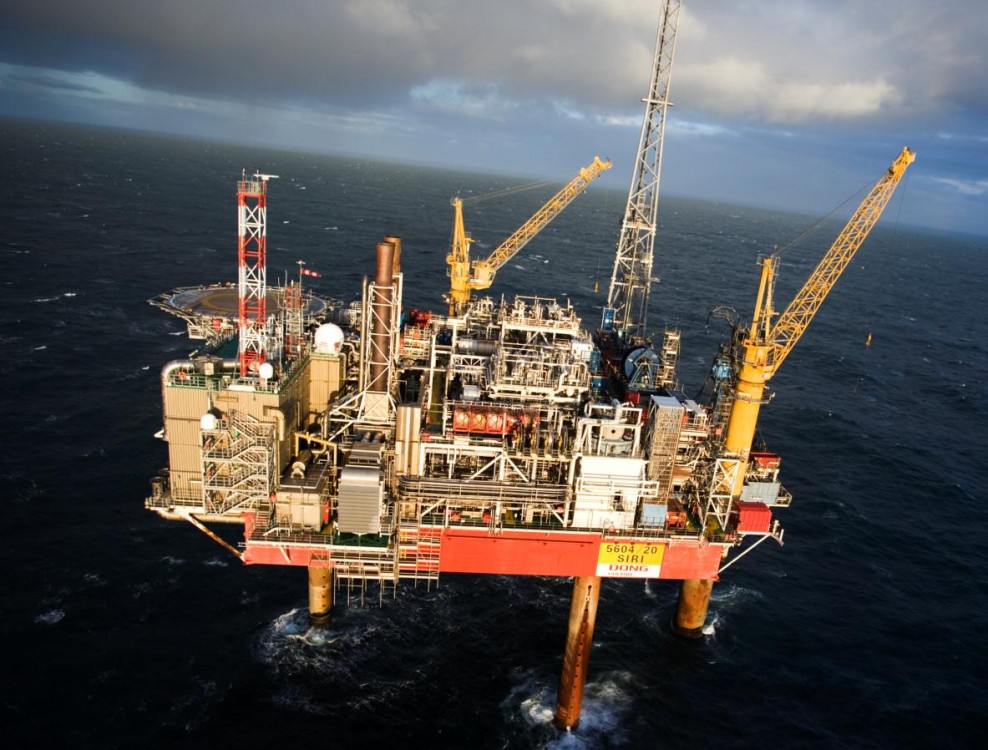
It might be old news that Goldman Sachs makes short-term profit off the work and labor of others. What's new is that this time, the otherwise well functioning and barely corrupt democratic welfare state, Denmark, has become a victim of the bank's inextinguishable hunger for profit.
Goldman Sachs stands to make a huge profit from the purchase of 19% of Denmark's national energy company, Dong Energy, for 8 billion Danish kroner ($1.2 billion) two years ago. When Goldman bought it, the energy company was valued at $6.7 billion, a suspiciously low price.
Dong Energy, which had its first day on the Nasdaq Copenhagen stock exchange on Thursday, profits greatly from North Sea oil and gas. Lately, though, more and more of its revenue comes from wind power, making it a valuable asset of economic and national interest.
Many analysts warned that not all was right, and that it was not in the Danish taxpayers' interest, to privatize as valuable an infrastructure as Dong Energy, and certainly not for such a low price. When it was announced that a big chunk of the company was being sold to Goldman Sachs – the “vampire squid” known for its dubious business methods and its part in causing the 2008 financial crisis – Danes went to the streets in the thousands protesting against the sale.
The former minister of finance, Bjarne Corydon, was so eager to privatize the energy company that he ignored the massive protests, which included nearly 200,000 signatures opposing the sale. He even ignored the exit of one of the government coalition parties and went through with the deal. Now, two years after the muddy affair, the energy company has been announced on the stock market and suddenly Dong Energy is valued at $15 billion.
What does this mean? It means Goldman just profited by $1.7 billion in two years, since the bank's shares now are worth roughly $2.9 billion. By comparison, normal stocks increase their value at 4% annually.
A Very Bad Deal for Denmark
While the bank secured a huge short-term profit, the small Scandinavian country has sold parts of its very profitable energy company far too cheaply and missed out on that profit. The argument for selling Dong was that the money was needed to construct windmill parks.
But rather than giving a state loan or selling it to Danish pension funds, which also bid on the energy company, the company was quickly gobbled up by Goldman which had secured the support of the country's finance minister. After secret back-room deals with the bank, Corydon decided sell Dong Energy to Goldman, and only a tiny fraction to a couple of pension funds, rather than keeping the energy company in Danish hands, and securing Danish interests.
“The decision is made from what was the best deal for Dong and the state," Corydon claimed. "In connection with the capital increase, we have obviously taken the best overall bid. And I cannot see what the motive would be to select a lower bid. I certainly believe that the terms are reasonable."
Not only was the share of Dong Energy sold far too cheaply, but Goldman Sachs also gained lucrative conditions such as veto power on the board, despite its minority share. Although the Danish state remains the majority owner of 58%, it does not have executive control over the company any more. And the deal ensured that the Danish state would cover almost any losses in the future, while Goldman Sachs would – and already did – fully benefit when Dong Energy was announced on the stock exchange.
Poul Nyrup Rasmussen, former prime minister and leader of the Social Democrats, the same party that Corydon belonged to, strong criticized the deal, saying: “This is a giant, historical mistake. If the Danish government must make a deal with a group of lawyers from Goldman Sachs, you have to come completely and extremely well prepared. These people are used to eating small countries for breakfast.”
Rasmussen blames the ministry of finance and Dong Energy´s CEO, Henrik Poulsen, for acting against the interests of the company's real owners – the Danish people – and selling it so cheaply to Goldman, while allowing the leadership of Dong Energy to buy cheap shares as their reward for the sale.
“Firstly, these kinds of bonus deals in public institutions are wrong. Secondly, if the leadership faces a huge, personal profit from buying cheaply when the shares are sold cheaply, you have a negotiation situation where the leadership's interest is selling the shares as low as possible, while society's interest on the contrary is selling as expensive(ly) as possible,” Rasmussen said.
Loss of Values
Part of the debate over the sale was the short-term profit that Goldman Sachs was expecting to make. While the bank and Corydon denied that this was the case, it became clear from the beginning that Goldman intended to rake in money fast, by whatever nefarious means necessary.
For starters, the bank used its power and demanded the outsourcing of many tasks. Its refusal to accept Danish salaries, and its ignorance of Danish interests, were underscored by its demand for lower payments to Danish subcontractors and even by replacing those subcontractors, who refused to deliver services cheaper using Asian alternatives with low-paid labor.
The bank's ownership of Dong Energy has likewise been placed in tax havens, so rather than contributing to the Danish welfare state, the revenues from the sale are now placed in the pockets of rich bankers offshore.
Another concern is the future of wind power produced by Dong Energy. While wind power is profitable and has momentum at the moment – not least due to the plunge in oil prices – this could change in the future. Many people therefore fear that Goldman's veto power will be used against the expansion of green energy in favor of continued investment in coal, oil and gas – despite wind power's expansion being a prime argument for selling Dong in the first place.
Privatization for Personal Gain
The earliest initiative to privatize Dong Energy was made in 2004 by the former Danish government, headed by the ultra-neoliberal Prime Minister Anders Fogh Rasmussen, in order to “secure better competition and improve services.” After the controversial privatization two years ago by the more left-leaning government, Anders Fogh Rasmussen was controversially hired by Goldman Sachs as a political advisor in order to secure a better image of the bank among Danes.
This is a clear case of banks, corporations, CEOs and democratically elected politicians holding hands and working together against the public's interest. Denmark generally has a good reputation as a welfare state; according to Transparency International, it ranks as the single least corrupt country in the world. But even in Denmark, nothing can prevent Goldman Sachs from hiring politicians once they have sold off one of the country's valuable assets so cheaply.
Finance Minister Corydon was also later rewarded for his Santa Claus role. As minister, he repeatedly spent large sums of taxpayer money for services with the powerful U.S.-based McKinsey & Company, among other consulting giants. Corydon is now positioned with a top job for McKinsey, where he is consulting private clients on opportunities for profit within the public sector, as well as advising how public sectors worldwide should run public institutions more like corporations.
Likewise, the now very wealthy CEO of Dong Energy, Henrik Poulsen, has personal connections within Goldman Sachs as well as McKinsey. This points once more to the fact that, in Denmark, the stewards of the public's interest acted against their role and responsibility, profiting personally on the deals they made while in power. A battle has been lost for democracy and accountability, while the pockets of the rich and powerful have grown further.
3 WAYS TO SHOW YOUR SUPPORT
- Log in to post comments

















Comments
Per West Møller replied on
Sale of DONG
There is always expropriation...
Per West Møller replied on
Sale of DONG
Danish public will have to expropriate. Or trade energy elsewhere. Denmark is one of the most corruptive countries in EU, what the story of DONG illustrate. Before Corydon, Poul Nyrup Rasmussen sold more compagnies to private funds, and probably has been a very good teacher for Corydon, when it comes to selling out of lucrative business.
Henrik Nygård replied on
Not true..
"Denmark is one of the most corruptive countries in EU"...
Nope. It is actualy the least corruptive country in the intire world. And have been for many years in a row..
https://en.wikipedia.org/wiki/Corruption_Perceptions_Index
Denmark is actualy know for its uncorruptivenes. And many danish companies struggle in foreign countries, because they are not used to "greasing the wheels", to get something done.
But that doesn't mean corruption doesn't exist in DK. Ofcause it does... It is however extremely rare. This being one of the few cases (however not proven to be corruption yet)
Jens Stjerne replied on
Bilderberg, may have been good, may still be, yet now suspicious
See Bilderberg attendees 2011 & 2013. Danish and Goldmann